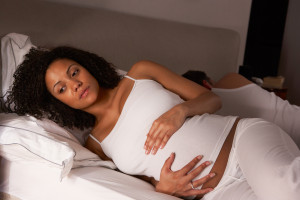
Source: Women Daily
Author’s Note: Since many messages about post-pregnancy bodies are directed at cisgender women, much of the language in this article reflects that.
The first time I was asked when I was expecting after giving birth felt pretty bad.
I had just left my building and was pushing my baby in a stroller as my almost three-year-old balanced on a boogie board on the back.
All of a sudden I heard an exclamation from the woman in 5-B who was chatting with a group of our neighbors on the sidewalk.
“Oh no, you didn’t!” she yelled.
Her tone panicked me, and I instantly worried that I had stepped in something, or forgotten to strap in the baby, or let my daughter outside without pants on again (something I had recently been chastised for). But it wasn’t that.
“You’ve got another bun in the oven already?” she shouted.
Um, no, I didn’t.
I just hadn’t lost all of the bun from the baby I’d recently had.
And while logically, I knew that I shouldn’t worry about the comments of a nosey neighbor, I couldn’t help but do so.
I was embarrassed, and I felt like I had failed somehow, and I had the sad realization that my positive post-childbirth body feelings (I’m back in my favorite spring dress! Nursing is going smoothly! I ran in the park for twenty minutes today!) were so easily affected by the perceptions the world had about my midsection.
Since I am soon to have a post-pregnancy midsection for the third time, I’m well aware of how easy it is to hyper-criticize the way one’s body looks after childbirth, and how hard it can be to celebrate the work that that body did to bring another human into the world.
But while some of this criticism is internal, we also live in a world that that seems to love babies yet thinks that we should erase any evidence of how they came to be. And as a result, this puts immense pressure on women to bounce back to their pre-pregnancy shape (or better!) in a lot less time than it took for that pregnancy to happen.
Here are five ways that we reinforce the idea that the post-pregnancy body should not look any different than the pre-pregnancy body – as well as some suggestions for challenging the idea that the maternal body is somehow lacking – or unattractive, or a failure – despite all the work that body had to do.
1. Fawning Over People Who Quickly ‘Get Their Bodies Back’ and Shaming Those Who Don’t
Much has been written about the increasing pressure on pregnant women to “get back” their pre-pregnancy bodies immediately after childbirth.
Blame has been placed on a culture that worships celebrities who walk out of the hospital carrying a newborn and wearing their size 00 jeans, and on people like “fit mom” Maria Kang who took to the Internet with her six-pack abs and three little boys asking moms who didn’t look like her, “What’s your excuse?”
I can think of an awful lot of “excuses,” but much more important than justifying what we look like is understanding some basic facts about post-pregnancy bodies.
For example, that after giving birth, it’s normal to still look pregnant for quite a while, and that post-pregnancy weight loss varies greatly between individuals.
It’s also crucial to realize that it’s a lot easier to do things like think about your diet and get some exercise if you have a lot of help, or don’t have other children at home, or aren’t racing back to work six weeks (or sooner!) after delivering.
There is a reason a lot of celebs look the way they do, and those reasons just aren’t realistic for most people – let alone what most people want to focus on.
2. The Creation of the Sexy Mom
In her 1995 book, Deviance, Conformity, and Control, sociologist Sharyn Roach Anleu
argued that “[in] western cultures, the maternal body and the sexually attractive body are incompatible” – and for a long time, that was true. But over the past twenty years, this notion has changed.
Janice Min, an editor best known for her long run heading US Weekly magazine, explained this shift in an New York Times op-ed:
“In the same way that gray hair went from natural to unacceptable in part because of Clairol’s relentless marketing in the 1960s, ubiquitous imaging of ‘sexy’ moms has rewired society’s expectations… Now, we have terms like ‘yummy mummy’ and ‘cougar’. On TV, June Cleaver and Roseanne have been replaced by Sofia Vergara’s Gloria on Modern Family, Courteney Cox on Cougar Town and cocktail-swilling, Botox-frozen Real Housewives.”
And while I wouldn’t argue for a return to the notion that motherhood negates sexuality, there is ever increasing pressure on women at all stages of life to fit into one very specific idea of attractiveness, even shortly after having a body-transforming experience like having a baby.
3. The Historic Discomfort with Female Bodies
When it comes to what our bodies naturally do, a lot of us are incredibly squeamish.
When it comes to things that are unique to what only certain bodies – and especially marginalized ones – do, that squeamishness can increase exponentially.
As Rebecca Kulka, a philosophy professor at Georgetown University, writes in her book Mass Hysteria: Medicine, Culture, and Mothers’ Bodies:
Female bodies and especially pregnant and newly maternal bodies leak, drip, squirt, expand, contract, crave, divide, sag, dilate, and expel. It’s not hard to see why such bodies have long seemed to have dubious, hard to fix, permeable boundaries… At least through the history of Western culture and probably beyond, these dubious boundaries have been a source of various species of intellectual and visceral anxiety.”
Indeed, there have been many times and places across centuries and continents when pregnancy was expected to be hidden from view, either with clothing that concealed it or, for women who could afford it, though periods of confinement that kept them out of public.
This was the case even in the not-so-distant US American past.
I grew up hearing the story of how my pregnant grandmother asked a man for a seat on the New York City subway when she was expecting my mom only to be told, “If you’re not fit to leave the house, you’re not fit to ride the subway,” and another about how my newly married aunt was fired from her public school teaching job in the 1970s as soon as her pregnancy began to show.
But this attitude has definitely evolved, and in a lot of places in the West, the current view towards pregnancy seems pretty different.
Tabloid magazines churn out a constant stream of pregnancy-related reporting. Amazon returns 50,225 results for pregnancy books. People who want to avoid form-fitting maternity clothes are often at a loss to find styles that don’t cling to their middles.
And in certain circles, pregnant belly portraits have become an almost expected rite of passage. (Of course, so too has pregnancy fat-shaming – but that’s a conversation for a different day!)
But while we can see how views on the pregnant body shift over time, in many ways, it’s easier to embrace that body since it isn’t actively doing a lot of the physical things like the laboring, discharging, lactating, and menstruating that the newly maternal body is often so actively engaged with and which make a lot of people incredibly uncomfortable.
As a result, much of our social discomfort has redirected away from the pregnant body and to the postnatal body.
4. Discomfort with What You Need to Do Get a Baby In and with What You Need to Do to Get One Out
When I was pregnant the first time, one of the middle schoolers I worked with asked me if I was a virgin.
I didn’t have time to give my standard answer to personal questions, which was something along the lines of “I’m just curious how having that information about me will affect your choices” before another kid yelled out, “Um, she’s pregnant, duh!”
That exclamation silenced the room, and I had the awkward feeling that my seventh graders were uncomfortably considering the idea of their teacher having sex.
Because that’s the thing: Even in a world where there are countless ways to get pregnant without having penis-in-vagina sex, when we see someone pregnant, the idea of sex isn’t far behind.
Similarly, while plenty of people who have babies delivered via C-section, the fact that a baby comes out of a person’s vagina – a sex organ – is a hard thing for some folks to swallow.
So when a woman’s body is visibly changed after pregnancy, the link between sexuality and these changes can make the disparaging way we view the post-pregnancy body even more fraught – even for those who haven’t been in middle school for an awfully long time.
5. Couching Body-Shaming as a Health Issue
Over the past hundred-plus years, pregnancy and birth have become increasingly medicalized.
Now, medical interventions aren’t all bad, and we can surely celebrate the fact that maternal and infant mortality rates in the West are nowhere near what they once were. But they also aren’t all good.
And one of the negative results is that women themselves are often held responsible for their pregnancy outcomes, since they are perceived to have disregarded medical advice if something goes wrong.
As a result, it becomes acceptable to couch maternal body-shaming in the language of health.
For example, we constantly get the message that gaining too much weight while pregnant will lead to conditions like diabetes and preeclampsia or is a surefire way to stay fat forever – something we are cautioned would be just devastating.
Then after giving birth, women are fed dire warnings about how not losing pregnancy weight will lead to terrible health outcomes now and in the future – and are given a stream of advice about how to get their bodies back (as if a body was something that could actually be “lost”).
If this doesn’t work, they are targeted by ads from plastic surgeons for “mommy makeovers.”
But what new parents really need is support in the form of childcare, maternity leave, and solid mental health care.
We also need support for those who enter pregnancy with eating disorders and support for those who develop them during pregnancy or after, since body policing can be particularly complicated for folks in these situations to navigate.
As Claire Mysko, the author of Does This Pregnancy Make Me Look Fat says,
For women who have histories of eating disorders, pregnancy and new parenthood can trigger some of the big issues at the root of these illnesses: perfectionism, a loss of control, feelings of isolation, and sometimes memories of past trauma or abuse. If body image or food and weight concerns are making it difficult to enjoy life, feel good about yourself, or bond with your child, that’s a sign to reach out for help.”
If we actually care about maternal health, those things are going to do a lot more than pushing crash diets and tummy tucks.
Remember: Some People Love Their Post-Pregnancy Bodies (And So Can You!)
Despite a barrage of negativity, not everyone hates their post-pregnancy bodies.
Today.com did a survey of over 300 women that yielded some interesting results: Although 70% of respondents said they felt worse about how their bodies looked after having kids, 30% said they liked their post-pregnancy bodies better and felt more “powerful and confident” in their looks.
The authors of a paper published in the Journal of Reproductive and Infant Psychology took a more scholarly view.
In “Baby or Beauty: A Study Into Post-Pregnancy Body Image,” they explain that when we ask women how they feel about their postpartum bodies, we might be assuming that negative responses refer to body image when in fact that is not what is being critiqued.
As they write, “Postpartal women may be more concerned with the body’s ability to function than their actual physical appearance, thus suggesting the ‘mostly dissatisfied’ finding may be an artifact of the way data are collected.”
But even though we don’t all hate our bodies after-baby, too many of us are dissatisfied with what we see in the mirror postpartum.
And while we can surround ourselves with people who will reinforce positivity – and also consider a media fast – it’s also important to acknowledge the impact of living in a culture that is hell-bent on telling women at all stages of life that their worth is directly correlated to their looks, and that what those looks are should only conform to a very narrow definition of beauty.
Just like we wouldn’t expect our adult bodies to look the way they did when we were kids, we need to acknowledge that it is perfectly normal for our post-pregnancy bodies look different than our pre-pregnancy bodies.
Because really, we will all be better off once we begin celebrating the body that nurtured a baby – and view at any changes that come of this as proof positive of this effort – instead of only celebrating bodies that have successfully hidden the fact that they have ever given birth.
[do_widget id=”text-101″]
Ellen Kate is a Contributing Writer for Everyday Feminism. She’s a health educator, sometime writer, and mom. She has worked at Manhattan’s Museum of Sex, developed sex education curricula in Mumbai, India, and run HIV prevention programs for at-risk teens in the South Bronx. Currently, Ellen teaches human sexuality at Brooklyn College (something she also did at Rutgers University). Ellen also runs About.com’s LGBT Teens site. More of Ellen’s writing can be found here. Follow her on Twitter @ellenkatef.
Search our 3000+ articles!
Read our articles about:
Our online racial justice training
Used by hundreds of universities, non-profits, and businesses.
Click to learn more




















